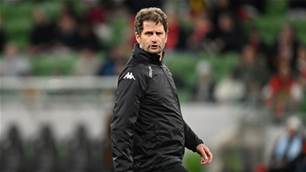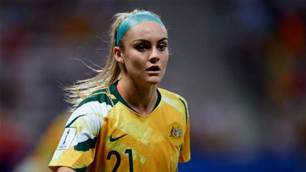Former Matildas star Alicia Ferguson enjoyed a glittering playing career that saw her win five Australian domestic championship titles as well as represent Australia at two World Cups and an Olympic games.
But her post playing career has been just as rewarding with the former Queensland Sting and Brisbane Roar legend loving her ongoing involvement in a game that has opened so many doors for her.
Speaking from London, her home for the past nine years, Ferguson admits life is good in the old dart.
"I love it, I am loving working 100% in women’s football at the moment," she beams. "It's pretty cool. Work over here for me is phenomenal. It's a football mecca. I'm saturated with football. Now with all the Aussie girls in the UK and Europe, it's happy days for me."
Ferguson, one of the most friendly and approachable people in football, insists her transition from being an elite footballer to establishing a successful media career in production and broadcasting was helped by her experiences playing the world game.
"There are transferrable skills as well as motivation, application, attitude, coming back from adversity and all the things you face in the sporting environment, that helps you prepare for the big bad world," she admits. "All that experience you get coming back from injuries, non-selection, means you learn a lot about resilience which helps you build an armour that you can use in the real world.
"Those buzz words we hear, we can put them into action."
Ferguson, who was capped 66 times by Australia, admits she loves reminiscing about her playing days where she graced the field alongside Matilda greats such as Heather Garriock, Sarah Walsh, Julie Murray, Joey Peters and Alison Forman to name a few.
"Some of my best mates in the whole wide world are through football. The memories we have shared and the experiences we have shared are never going away. It's always good to catch up and talk about the good times, bad times and the bloody funny times we have had."
A personal favourite is her first trip to North Korea in 1999, one of three visits she has made to the communist nation.
"The first time I went I was quiet young and ignorant about North Korea. I thought North Korea was simply North of South Korea without any understanding of what a unique country it actually was.
"This was one of the funnest tours I have ever been on. Because of the conditions in North Korea we had to make our own fun. We had the run of the whole hotel. We played hide-and-seek in a 30 floor hotel, played cricket in the hallways. We really bonded on that trip.
"We used to hang out in the room occupied by Shelley Youman and Sarah Cooper, who were the queens of the card playing group, and all the social activity was in their room."
Ferguson pays glowing tribute to the likes of Youman and former skipper Forman, whom she credits with hardening her for the world of international football.
"I bloody loved Shelley, I was a striker but then became a central midfielder like her. She is a woman after my own heart. There was no nonsense about her. She and Alison were great role models. They were great technically, had great engines, great vision and they didn't take any nonsense from us young ones.
"They would tell you if you did something well, and they would tell you if you did bad. You knew where you stood but not in a nasty way or anything.
"They would kick the lump out of you. I loved it as they tested my resilience as a footballer. They taught me what you needed to play for Australia. You can't represent your country if you don't have that resilience. If they didn't do it, we wouldn't have been prepared to play against tough opposition."
Ferguson acknowledges the game has changed and credits the professionalism of footballers now for changing the landscape and improving the standard of play.
"The culture and the environment is different in football now. They are professional athletes so the game has changed. Players are great at keeping the ball so they don't give you the opportunity to tackle them anymore. If you want to be a really physical team you aren't going to get the ball off people.
"A lot of people say the current generation are soft, it isn't that at all, the game has simply changed. It's about keeping possession now which makes it harder to go in for hard challenges. If you are a good defender, its not about kicking them into row Z now, its about intercepting the ball and reading the play."
Ferguson, who made her Australian debut as a 15-year-old in 1997, feels fortunate to be part of an era which she calls the 'transition phase' of the Matildas playing group.
"From 1995 to 1999 the technical ability of the players went up a notch. We were very lucky we had Greg Brown at the 1999 World Cup and Chris Tanzey during the Sydney 2000 Olympics.
"Our development technically and tactically as a team improved hugely due to Chris' minute attention to detail. If you look at our game back then...phases of play, passing patterns and stuff like that were really good."
Despite being retired from the game for over a decade, Ferguson still retains a strong passion for growing women's football and is pleased to see the current crop of players enjoying the benefits of the women's game becoming a full time professional sport.
This is no more evident than in her adopted country and Ferguson, who covers the English Women's Soccer League for Optus Sports, is full of praise for the financial investment in England although she laments that her motherland will find it hard to keep up.
"It's great to see the players getting paid decent amounts now in England. There is still a disparity of course between the top and bottom clubs, but a lot of players now just play football and don't do anything else. They are as professionals and its great to see them make a living out of it.
"Some clubs spend more than others obviously and reap the benefit from it. Manchester City is a fabulous example. Going to their campus and their academy, the girls have their own stadium and everything.
"There is great integration with the men and women. They have great training facilities. They have all the support services they need. They even get fed. The marketing and commercialism is all the same. The women are so visible.
"Unfortunately in Australia you are not going to get that level of investment. It comes down to money, its that simple really.
"A lot of the progress in England has come from the success of the men's teams. Leicester City for example have a clear plan to get their women into the top division and win trophies. They have a very clear plan for that. When you see clubs like that see the potential for women's football its great and you will see the success from it."
Although she missed out on the financial benefits of playing compared to what the current crop of players now enjoy, there is not even a hint of resentment from the gracious Ferguson.
"I think its great the girls are making decent coin now. I would never begrudge the current generation. People ask me if I want to be a footballer now? I say no as I loved being a footballer when I did. We had our time, did our stuff and my generation played our part to help progress the game. If these current girls can go on and make a living out of it, brilliant, crack on! Its about them now and so it should be."
Ferguson like all former Matildas was thrilled to see Australia win the hosting rights for the 2023 World Cup along with New Zealand. She encouraged Australian footballing authorities to use the tournament as a catalyst or change.
"What we do have is a fantastic opportunity to host the World Cup with New Zealand. FFA have a nice time frame to do something positive for the game because that could attract sponsors and those who want to invest in the game. A World Cup is always good and there is a great demand for the women's game. We could do something special."
While there has been much excitement about the appointment of Tony Gustavvson as Matildas coach leading into 2023, there has also been concern in Australia about the lack of funding put into coaching in women's football.
The average W-League coach gets $25-35,000 whereas an assistant would get around $10,000. Ferguson acknowledges this is a problem but encouraged a focus on youth development, pointing out the successful models in world football are driven by developing younger footballers.
"In Europe all of the development coaches are paid really good wages because that is where you have the most influence on players. Its as simple as that. In the most successful countries, the players at the development level are so important and so critical to how what the senior national team is doing.
“Its about trying to work out how big the pot of the money is, and how you distribute it. There isn't as much to go around to fit so many things so you have to prioritise."
Related Articles

'Timing not right': Montemurro's verdict on Matildas vacancy

Matildas: 'Fourth at the Olympics is honestly the worst place you could come'
.jpg&h=172&w=306&c=1&s=1)












